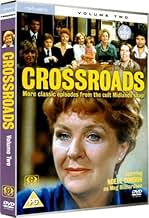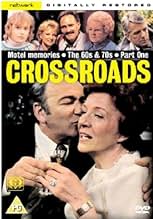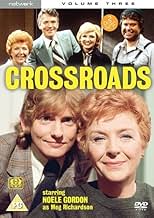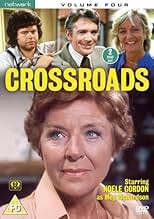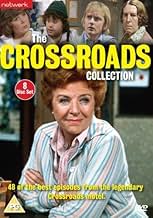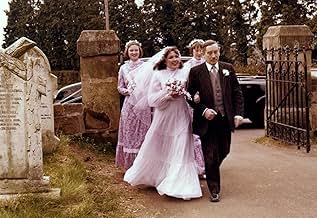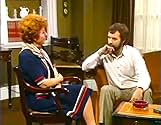The four-or-five-times-a-week adventures of a motel owner and her son, daughter and staff. Drama was never far away from the ringing of the reception bell.The four-or-five-times-a-week adventures of a motel owner and her son, daughter and staff. Drama was never far away from the ringing of the reception bell.The four-or-five-times-a-week adventures of a motel owner and her son, daughter and staff. Drama was never far away from the ringing of the reception bell.
Browse episodes
Featured reviews
I was never a fan. Despite the factory production-line acting and writing it gave simple pleasure to millions and that's surely a good thing.
Reviewers then as now enjoy indirectly mocking the masses for their lack of taste by mocking what the masses enjoy.
Reviewers then as now enjoy indirectly mocking the masses for their lack of taste by mocking what the masses enjoy.
The previous reviewer is quite right. Crossroads was of the "so bad, it's good" ilk. Still, during its peak it had its followers including the (then) prime minister's wife, Mrs. Mary Wilson, a staunch follower. Crossroads suffered from a hectic schedule, originally five days a week. No time for retakes, so it was not uncommon to see a camera crew whizzing by in the background, or to witness an overhanging microphone at the top of the TV screen. Fluffed lines guaranteed in every episode. In its favor, it did not bring dead and buried characters back to life, or have five different actors play the same character (as is common in US soaps). Aside from those mentioned, there were many other memorable characters such as the mousy postmistress Miss Tatum (Elisabeth Croft), the "tart with a heart" hairdresser Vera Downend (Zeph Gladstone), and the kitchen gossip Amy Turtle (Ann George, who deserved an award for worst actress).
Looking back years later, and having spent ten years in the States, I can only compare Crossroads star Noele Gordon to Susan Lucci, the queen of US soaps. Gordon was hardly the glamorous star that Lucci is, but she was undoubtedly THE queen of the UK soap. When she was unceremoniously dumped from Crossroads in 1981, there was a public outcry, and the soap's fate was sealed (as was Gordon's who never quite got over her dismissal and died four years later). Crossroads was given an overhaul and plodded on for a few more years. In the last episode, Jane Rossington (Gordon's screen daughter who spoke the first lines in 1964) drove off into the distance (sunset unavailable) and it was the end of an era. Crossroads and Coronation Street often replaced each other at No. 1 in the charts, just as Coronation Street and Eastenders do these day. That's how good/bad it was.
Looking back years later, and having spent ten years in the States, I can only compare Crossroads star Noele Gordon to Susan Lucci, the queen of US soaps. Gordon was hardly the glamorous star that Lucci is, but she was undoubtedly THE queen of the UK soap. When she was unceremoniously dumped from Crossroads in 1981, there was a public outcry, and the soap's fate was sealed (as was Gordon's who never quite got over her dismissal and died four years later). Crossroads was given an overhaul and plodded on for a few more years. In the last episode, Jane Rossington (Gordon's screen daughter who spoke the first lines in 1964) drove off into the distance (sunset unavailable) and it was the end of an era. Crossroads and Coronation Street often replaced each other at No. 1 in the charts, just as Coronation Street and Eastenders do these day. That's how good/bad it was.
Like many people at the time of the original Crossroads Soap Opera i fell in love with it. But i did not notice any wobbly sets also i did not consider any of the acting was wooden. The story lines i thought were good.
For about 25 years, this was British TV's best loved bad soap. Shaky sets, some over the top storylines and a host of okay actors revelling in the whole affair.
Set in a fictitious Midlands town, it centres on the staff and guests at the eponymous Motel - in the early days run by Meg Mortimer (Noelle Gordon) and later by Nicola Freeman (Gabrielle Drake).
The best characters included irascible Scots chef Shughie McFee (from The Great Escape); David Hunter (Ronald Allen from a Night to Remember) and Hammer veteran Sandor Eles (Countess Dracula) as a cliched chef.
Look out too for the late Jeremy Sinden (Donald's son) who went on to play one of the ill-fated pilots in Star Wars - a little movie he shot inbetween breaks from Crossroads.
However, head and shoulders above them all was scruffy, backward, lovable Benny Hawkins who never had much luck - his gypsy girlfriend was knocked down and killed on his wedding day - but with his woolly hat and good heart, he was the Midlands version of Forrest Gump long before Tom Hanks cornered the market in loveable simpletons.
The whole thing was repackaged and revamped as Neighbours, a show also boasting a Tony Hatch theme tune. At one point in the late Seventies, Paul McCartney and Wings even provided a rockier theme tune for this Seventies slice of nonsense, nicely spoofed as Acorn Antiques in Victoria Wood: As Seen on TV.
Set in a fictitious Midlands town, it centres on the staff and guests at the eponymous Motel - in the early days run by Meg Mortimer (Noelle Gordon) and later by Nicola Freeman (Gabrielle Drake).
The best characters included irascible Scots chef Shughie McFee (from The Great Escape); David Hunter (Ronald Allen from a Night to Remember) and Hammer veteran Sandor Eles (Countess Dracula) as a cliched chef.
Look out too for the late Jeremy Sinden (Donald's son) who went on to play one of the ill-fated pilots in Star Wars - a little movie he shot inbetween breaks from Crossroads.
However, head and shoulders above them all was scruffy, backward, lovable Benny Hawkins who never had much luck - his gypsy girlfriend was knocked down and killed on his wedding day - but with his woolly hat and good heart, he was the Midlands version of Forrest Gump long before Tom Hanks cornered the market in loveable simpletons.
The whole thing was repackaged and revamped as Neighbours, a show also boasting a Tony Hatch theme tune. At one point in the late Seventies, Paul McCartney and Wings even provided a rockier theme tune for this Seventies slice of nonsense, nicely spoofed as Acorn Antiques in Victoria Wood: As Seen on TV.
At its best probably in the 1960s, Crossroads was always terrific fun.
The programme had an innocence and lightness of touch in its 60s days that it lost in the 70s and great fun was to be had as sets occasionally wobbled and studio arc lights fell down! The 1960s characters were great - and included such legendaries as the Richardsons and Hugh Mortimer, Diane, Tish Hope, Marilyn Gates (mark 1!) Mr Lovejoy and Mr Booth and Amy Turtle.
The show was daring - a storyline about a single mother, a waitress at the motel, was strong stuff back then. But murder was more difficult. In a 1960s story involving the character Gerald Bailey (whose wife, Ruth, later married Meg's brother) great pains had to be taken so as not to "distress" viewers in a storyline originally envisaged as murder, but later reconfigured to "sudden death".
However, by the late 1960s, attempted murder WAS allowed as we saw the character Malcolm Ryder trying to poison the show's heroine, Meg Richardson - his wife in the plot at that time! The 70s and 80s episodes are also great fun. The 70s episodes have added value as we see all sorts of middle aged people wearing the garish and flared style of clothes which were so cutting edge and trendy amongst the young hippies of the 1967/1968 Summer Of Love. Younger 70s characters, like Martin Bell, look positively dowdy in comparison to the 60s fashion following older set!
The 70s and 80s episodes saw a continuation of cutting edge soap story lines - I particularly recall the introduction of Benny in the 1970s (learning difficulties) and the terrific Downs Syndrome and racism story lines in the 1980s.
In the 1980s, the show altered dramatically and it seemed a terrible shame to dispatch Meg, but Crossroads gave excellent value with the introduction of chararacters such as Valerie Pollard and Nicola Freeman and a brief return for Amy Turtle! I followed the show from start to finish and enjoyed it all, though I do feel now that the 70s episodes are rather over-hyped (so much 70s stuff really belongs to the 60s!). From wonky but lovable 60s soap to shoulder padded, witty but gentle late 80s ending, Crossroads was required viewing for me for an awful lot of years.
Happy memories!
The programme had an innocence and lightness of touch in its 60s days that it lost in the 70s and great fun was to be had as sets occasionally wobbled and studio arc lights fell down! The 1960s characters were great - and included such legendaries as the Richardsons and Hugh Mortimer, Diane, Tish Hope, Marilyn Gates (mark 1!) Mr Lovejoy and Mr Booth and Amy Turtle.
The show was daring - a storyline about a single mother, a waitress at the motel, was strong stuff back then. But murder was more difficult. In a 1960s story involving the character Gerald Bailey (whose wife, Ruth, later married Meg's brother) great pains had to be taken so as not to "distress" viewers in a storyline originally envisaged as murder, but later reconfigured to "sudden death".
However, by the late 1960s, attempted murder WAS allowed as we saw the character Malcolm Ryder trying to poison the show's heroine, Meg Richardson - his wife in the plot at that time! The 70s and 80s episodes are also great fun. The 70s episodes have added value as we see all sorts of middle aged people wearing the garish and flared style of clothes which were so cutting edge and trendy amongst the young hippies of the 1967/1968 Summer Of Love. Younger 70s characters, like Martin Bell, look positively dowdy in comparison to the 60s fashion following older set!
The 70s and 80s episodes saw a continuation of cutting edge soap story lines - I particularly recall the introduction of Benny in the 1970s (learning difficulties) and the terrific Downs Syndrome and racism story lines in the 1980s.
In the 1980s, the show altered dramatically and it seemed a terrible shame to dispatch Meg, but Crossroads gave excellent value with the introduction of chararacters such as Valerie Pollard and Nicola Freeman and a brief return for Amy Turtle! I followed the show from start to finish and enjoyed it all, though I do feel now that the 70s episodes are rather over-hyped (so much 70s stuff really belongs to the 60s!). From wonky but lovable 60s soap to shoulder padded, witty but gentle late 80s ending, Crossroads was required viewing for me for an awful lot of years.
Happy memories!
Did you know
- TriviaATV's budget for the show was so slender that some castmembers were seen on-screen in their own clothes that they'd worn to attend the studio recordings.
- GoofsThe March 1975 civil ceremony wedding of a fairly anonymous motel owner to a businessman - Meg Richardson and Hugh Mortimer - at Birmingham Register Office sees the city centre thronged with well-wishers; similarly the later affirmation/blessing at Birmingham Cathedral has a packed congregation, outside police supervision and reporters. Whilst in reality this reflects the interest of the general public in the show and its production, in narrative terms it is completely nonsensical.
- ConnectionsFeatured in A Change of Sex: Julia - My Body, My Choice (1980)
- How many seasons does Crossroads have?Powered by Alexa
Details
- Release date
- Country of origin
- Official site
- Language
- Also known as
- Crossroads: King's Oak
- Filming locations
- Ramada Hotel, Penns Lane, Walmley, Sutton Coldfield, West Midlands, England, UK(Crossroads motel: exterior scenes, 1980s)
- Production companies
- See more company credits at IMDbPro
- Runtime
- 30m
- Color
- Sound mix
- Aspect ratio
- 1.33 : 1
Contribute to this page
Suggest an edit or add missing content

